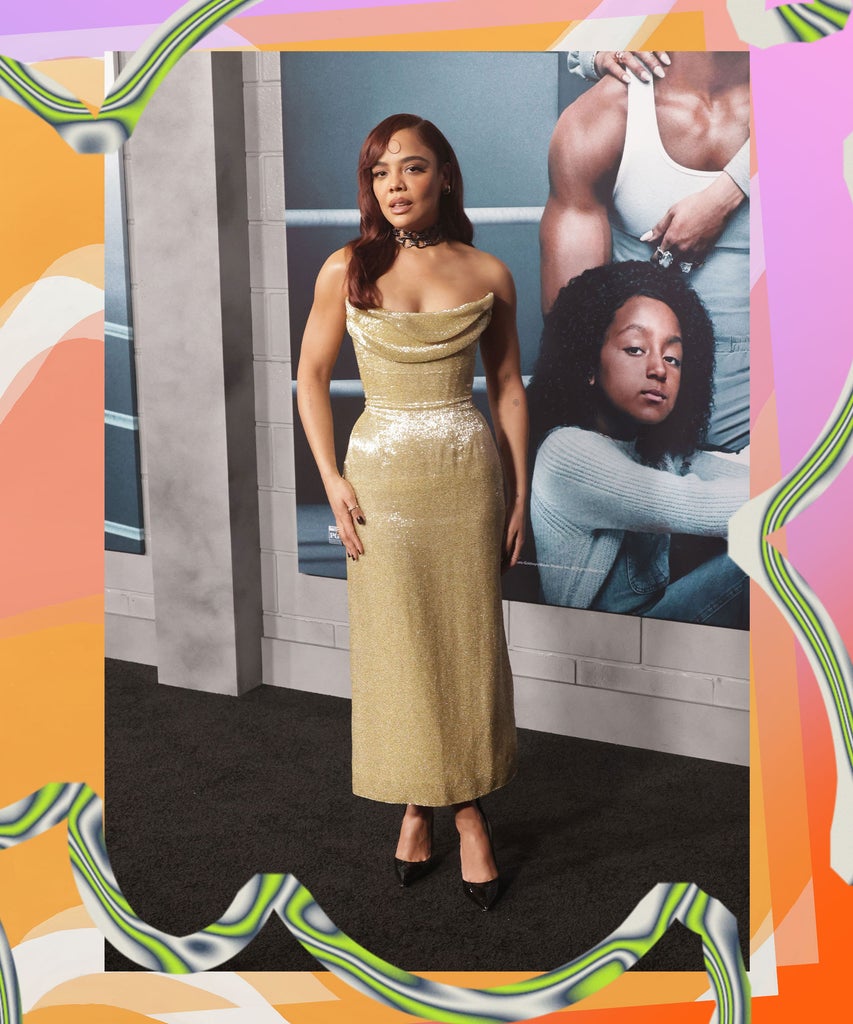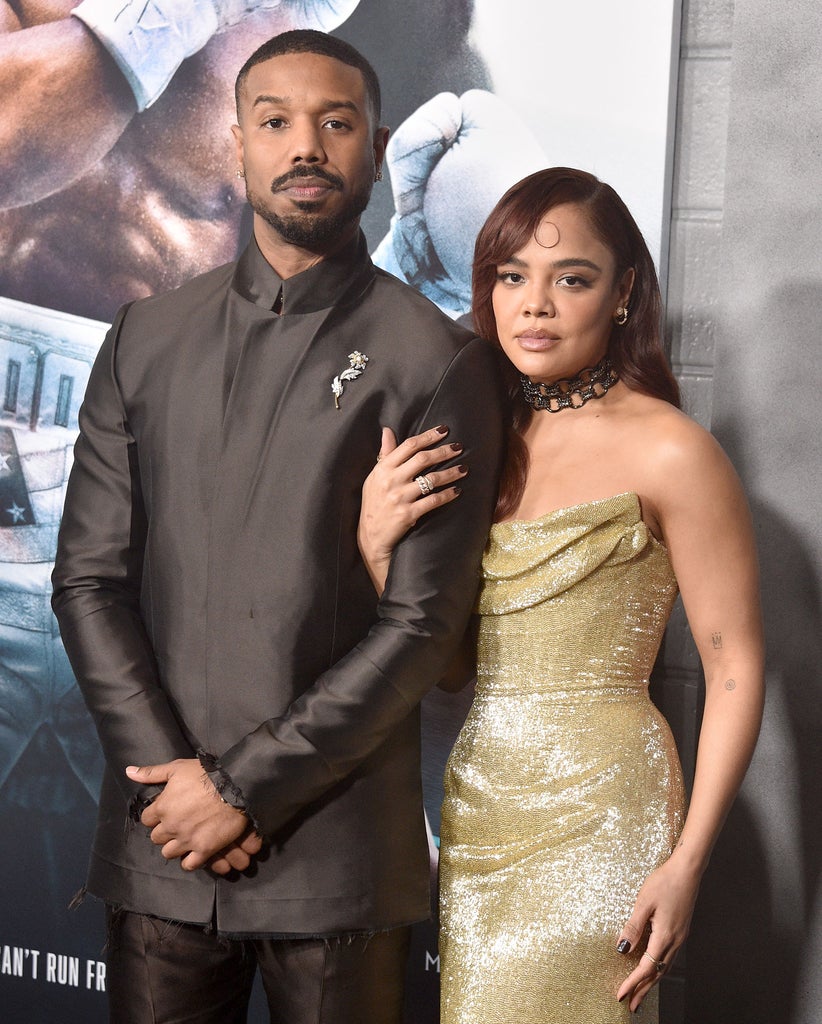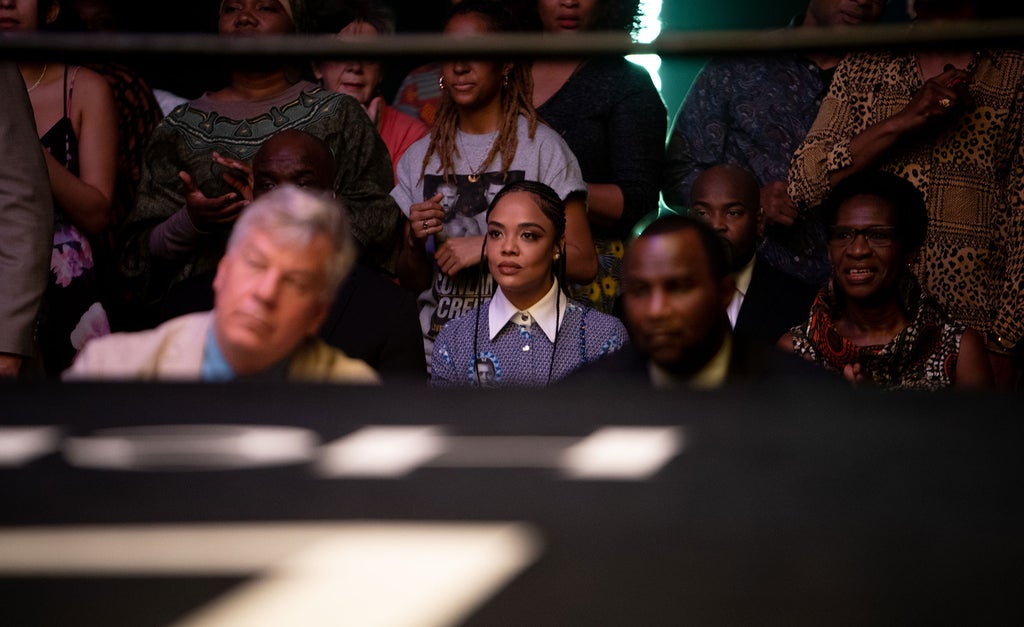
Rocky Balboa’s iconic ascent up the steps of the Philadelphia Museum of Art — out of breath and in grey joggers as “Eye of the Tiger” blares in the background. Adonis Creed (Michael B. Jordan) sprinting through the streets of Philly with his community on quads at his back — also in gray sweats, this time with Meek Mill as his soundtrack. These are two of the most legendary scenes in the Rocky/Creed universe. They are franchises known for epic training montages and mind-blowing bursts of physical endurance. But since 2015’s Creed — and now again in Creed III — it’s the quieter moments of vulnerability and softness that strike the biggest chord for me. In Creed, the moment when Adonis is tending to his then-girlfriend-now-wife Bianca’s twists lives in my head rent free. In the Jordan-helmed Creed III (his directorial debut), the tender seconds between Adonis, Bianca and their daughter Amara (Mila Davis-Kent) will crack your heart wide open. And there’s one person at the center of these subtle, beautiful scenes in the middle of a bombastic sports movie: the incomparable Tessa Thompson.
Thompson’s Bianca isn’t the stereotypical wife or girlfriend sports films are known for. There is no doubt that the Creed franchise revolves around Adonis Creed, but, as Thompson puts it, Bianca is the film’s “beating heart.” Jonathan Majors makes a splashy, enigmatic entry into the franchise with a performance you won’t be able to look away from (seriously, Majors’ Damian Anderson is chilling and charming, dangerous and disarming, all at once), but it’s Thompson who elevates the film from a classic showdown between two foes to a commentary on masculinity, marriage, motherhood, and what happens when two kids from Philly get everything they ever dreamed of — well, almost everything. The film finds Bianca at an interesting point in her career. She’s a successful songwriter and producer, but she’s stopped performing because of her hearing loss. She’s also the mother of a deaf daughter and wife to a soon-to-be retired famous boxer. Bianca’s story is as fascinating and thrilling as Damian and Adonis going toe-to-toe in the ring. And for Thompson, Bianca is exactly the kind of “complicated woman of colour” (a term she says is effective but as overused as “diversity”) she hopes to bring to life through her production company Viva Maude.
Days before the movie hits theatres (it’s out Friday, March 3), Thompson sat down with Unbothered at the Four Seasons Hotel in Los Angeles — dressed impeccably in a black blazer and pleated black skirt and accompanied by her beloved dog, Coltrane — to talk about stepping behind-the-camera herself, how proud she is of Jordan for doing the same, and what it was like when the pair went to couples therapy.

Unbothered: You’ve been making these films for nine years. How have you grown with Bianca?
Tessa Thompson: I kept saying eight and then, like the other day, Mike [Michael B. Jordan] was like, “No, it’s nine.” I couldn’t believe it! I remember when we were developing Creed III, we were looking at old photographs from the first one, and we both agreed we are babies in that. Obviously, we weren’t just talking about how we look like babies. We realised how much we’ve grown over the course of making these films. And I think a lot of our growth is also parallel to the growth of the characters. We are both parents in this film, not parents in real life. But I think in terms of the kind of conversations that we’re having together and separately around legacy, both Bianca and Adonis have transitioned out of their careers as they once knew their careers and they are now business owners. Bianca’s producing music. Mike’s character has his own gym and is looking after fighters and trying to think of the next generation of people inside of his sport. I think Mike and I are doing that in so many ways. We both have our production companies. We’re producing in earnest and really thinking about what our contribution is — not just to culture but to our community. I think that’s one area of growth that I really see parallel to these two people that we play.
I found it really interesting and important that Bianca is there to support Adonis, but she also has her own interior struggle going on. She talks about missing performing now that she’s pivoted to producing. As you mentioned, you are also producing now. I wonder if there are parallels between Bianca’s journey and you stepping behind the camera more and how you’re feeling. Is there an internal struggle that you’re feeling as well?
TT: It’s so funny that you should ask that because I’ve been working on something that would see me taking this step behind the camera in a real way like Mike has done on this. The difference is that I would not also be in front of the camera. I would just be directing and I have been having that internal conversation with myself of like, how will that feel? But so far with my production company, we’re producing things that are roles that frankly I would have given a pinky for years ago when I started my career. There’s a real pleasure in this idea of producing something that in success could make a star out of a young woman that was like me — someone who was looking at the industry being like, I don’t know if there’s enough opportunities for me. I don’t know if people see me in my humanity. The idea of being able to give that opportunity that would help a young woman navigate the kind of frustrations that I had when I was first starting in this business [being able to say], “Yes, you are seen, yes, there’s a place for you,” is really satisfying for me.
The thing that I feel more concentrated on instead of awards and how we praise things once they’re made is what gets made and who gets to see it.
tessa thompson
So, I’m not like “put me in, Coach!” I don’t feel the stress that Bianca is feeling because I feel really satisfied. But talk to me in some time [laughs]. I think the only danger — and I’ve spoken to some of my friends about this — is particularly [for] women who direct, and started as actors, is that I think sometimes there’s this idea that you can’t do both. I think we are boxed into spaces so often, particularly as women. But look at the legacy of this franchise — in Rocky, [Sylvester] Stallone is a man who could act, produce, write the things, star in it, and no one ever asked him many questions about it. He got to build an empire off of it. I don’t think women are afforded that same grace and opportunity, so we’re hoping to change that.
We’re in a really exciting time for Black women on screen and behind the camera. And right now we’re having this conversation about whether that work is being rewarded or recognised as it should be. I’m just on the outside looking in, but I’m still mad that Passing was snubbed last year. Do you pay attention to the awards conversation?
TT: It’s a great conversation to be had. And I just want to say, you said that as a journalist you’re on the outside. You’re not on the outside. I think you’re so much a part of the conversation and also creating the culture. Particularly when you speak about awards, we have to remember that those conversations begin super early, and a lot of it has to do with how journalists cover movies, frankly. They sort of create the narrative in terms of who might deserve praise. I think what tends to happen is then in retrospect, at the end or middle of the season, when we see that certain people aren’t being rewarded in the same way, then the conversation begins around legitimacy, the legitimacy of that. I think the conversation needs to begin earlier. I think there needs to be an awareness not just by journalists, but by the industry at large to say, look, we have a lot of history to rewrite in these moments and we have the opportunity now to really give praise to folks that historically have not gotten it.
I think when we look at awards — I haven’t been following the awards this year that closely — but I try to look at it, even though I work inside of the industry, as really just a fan. I love the movies I love, and when it comes to the award season, I don’t care. But I don’t watch sports and I have nothing else to root for [laughs]. So there are certain films that come along in a year that I care about. I care about Everything Everywhere All At Once. I care about how that film does because I love that movie. That movie changed my mind in terms of what is possible. That movie was so inspiring to watch as I’m writing, as I’m thinking about creation. But also, if in success, that movie makes more space and gives representation in ways that Hollywood desperately needs it, it’s fun to be able to root for that film. The thing that I feel more concentrated on instead of awards and how we praise things once they’re made is what gets made and who gets to see it. I think that’s really been the aim of my work as a producer and having a production company. I just want to make the work. What the world does with it, what academies or institutions do with it, is their business. But the work has to exist for anyone to acknowledge it in the first place.
It becomes their problem. If you aren’t acknowledging great work, that’s a YOU problem.
TT: It’s a you problem. And also as an actor, as a sensitive one, it’ll break your heart. I think if you get too invested in how things are recognized or not recognised, it’s [heartbreaking]. But I do appreciate you for holding space for us and Passing.
One of the things I loved about Creed III is that Bianca is basically telling Donny to go to therapy the whole movie. She’s pulling emotions out of him, really pushing back against toxic masculinity. Is the moral of Creed III that all men need to go to therapy?
TT: It’s like a full PSA for therapy [laughs]. But I think the moral of Creed III is that all people should go to therapy because it’s something that I think really has helped Bianca, for example. Something that I love about her is that I really enjoy quiet heroism. I love the things that we all do as people that we know inside of our bodies feel heroic, but no one ever realises it. We’re overcoming our own sort of limitations, I guess. I would say one of her limitations when we first met her in the first Creed was an inability to really be totally vulnerable. There was a kind of tough exterior. She’s this Philly girl, but it also had to do with her own trauma and damage, which was a narrative we never got to explore completely. But Ryan Coogler and I knew that’s where it was coming from. And so her journey has been so much about softening, and motherhood is something that has softened her and her own struggles have softened her, but also her work in therapy. [She’s learned] it’s okay to be seen by somebody in your fullness, in your softness. And she constantly reminds me to just stay in therapy, get into therapy, talk about your feelings. You don’t always have to have it figured out. You don’t always have to be tough. But I really liked the idea. And finally, Mike and I actually went to therapy together. We did couples therapy.
Wait – in character?
TT: Yes, in character, but it ended up being like — the line sometimes between character and us get blurred because we bring so much of what we’re exploring personally to the characters in general. So funnily, it was the first time…. I’m probably saying too much. I’ll say it was an early experience in couples therapy for us both [personally], but it was as these characters, which is very weird. But I think it reminded us of our own personal lives that going to therapy, even when a relationship is good, can be a good thing if you’re trying to just sharpen communication and figure out how someone works. It’s useful in so many relationships.
I’m probably saying too much! I’ll say it was an early experience in couples therapy for us both [personally], but it was as these characters, which is very weird.
tessa thompson
OK, I can’t move past this. What came out in these therapy sessions?
TT: [laughs] OK we were in therapy, yes, as Bianca and Adonis, but we were also reflecting on our own relationships. Since we’ve been making these movies for eight, nine years, we’ve seen each other through various stages in our own romantic things. So we know stuff about each other’s lives. We shared and talked about it. So therapy ended up starting at work and getting more personal. Also, it was a chance for us to really talk to a couples therapist and understand what are some of the things young parents who are trying to balance their own dreams and aspirations? What are the themes that you see? What are the things they might be up against? What might be their impediments to happiness or success as a couple? That was really fascinating also to hear from her and bring that into the stew.
We don’t often see the deaf community represented on screen, especially not Black deaf women and girls specifically. The representation that you and Mila bring in this film is so important….
TT: We have representation in our film that’s so sorely missed. There’s a whole community of people that are going to feel seen in the context of our film in a way that they didn’t…. And frankly, that they couldn’t with me, as a hearing actor playing that part. I could never have told the story in the way that Mila gets to, because she’s a part of that community.
We’re going to end on some rapid fire questions. Three words to describe Creed III:
TT: Heartfelt, propulsive. Bold.
One word to describe Michael B. Jordan as a director.
TT: Oh, my God. Cute! He was just so cute every day.
Would he like that word?
TT: He would hate that. He would hate that so much. I’m so sorry, Mike.
What’s your favorite word in ASL?
TT: Well, my favourite word is just “I love you.” And because Mila and I, when we say it to each other, we do this [puts hands together]. It’s also what she does with her mom.

What do you think the biggest misconception about you is?
TT: Oh, my God. There are a lot. Probably about my dating life. A lot of misconceptions there. But what can you do?
What’s a beauty product you can’t live without?
TT: I’m not just saying this: Luminous Silk Armani [Editor’s note: Thompson is the ambassador of Armani beauty]. I can’t live without it because I wear it in real life and Bianca wears it, so I need it.
Who would win in a fight? Valkyrie or Jonathan Majors’ Kang?
TT: Valkyrie!
This interview has been edited and condensed for clarity.
Like what you see? How about some more R29 goodness, right here?
The Snacks Are Fighting In The “Creed III” Trailer